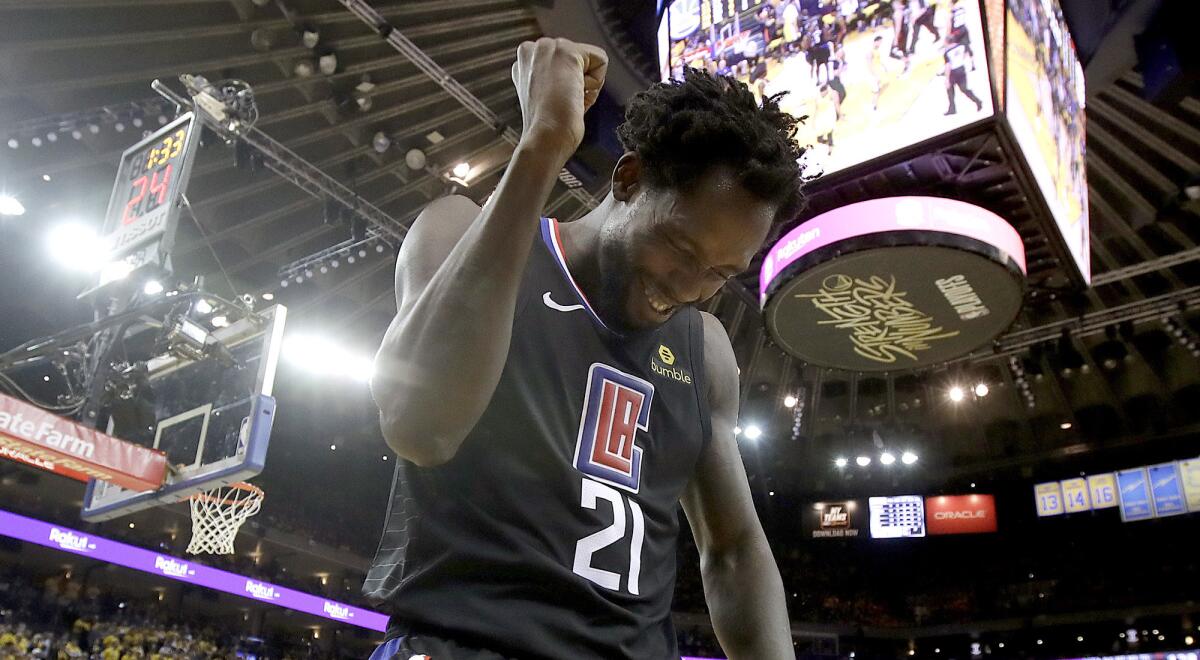The secret to Clippers’ historic comeback vs. Warriors has been hiding in plain sight

- Share via
As the bus barreled from an arena in Oakland toward a luxury hotel in San Francisco on Saturday night, Clippers guard Patrick Beverley focused on the glowing screen of a laptop. He wanted to see Game 1’s seams, to know where exactly it had come apart hours earlier.
The video ran, then he’d rewind. Play, rewind.
Beverley saw the Clippers’ inability to capitalize on Golden State’s turnovers and their loss of composure toward referees during a key stretch late in the second quarter. He saw the way Stephen Curry, the star of the two-time defending NBA champion and top-seeded Warriors, made contested three-point attempts, and the way the Clippers missed open looks.
Amid a 17-point loss, he noticed something else, too.
“That we can play with them,” Beverley said.
He paused his retellling. It was Monday night in a nearly empty locker room inside Oracle Arena, less than an hour after the eighth-seed Clippers came back from 31 points down to win Game 2, 135-131. The comeback was historic — the largest in NBA playoff history — and yet just the latest in a Clippers season defined by them.
“We knew if we did the right things, then we’ll be all right,” Beverley said. “We were. Stole the game, bro. It’s big time. So big time.”
Sign up for our daily sports newsletter »
Beverley’s team had stolen games when trailing by 20, 25 and 28 points, becoming the first in the last 20 seasons to win multiple games in which they trailed by 25 or more.
Those experiences led them to remain calm when they entered halftime Monday trailing by 23.
“Having done this so many times during the season, we know we can do it every game,” forward Danilo Gallinari said.
The Clippers understand trailing big isn’t a sustainable game plan. Those comebacks are a source of both pride and some sheepishness. Told the 31-point rally was the largest in playoff history, Lou Williams — whose 36 points changed the course of the evening — smiled weakly at the hole Los Angeles had put itself in.
“Yeah that’s not a great stat to have,” he said, “but it happened, so we’ll take it.”
During a stunning night, Williams had one of the most startling turnarounds of anyone. He recorded more turnovers (three) than field goals (one) in the first half. Emerging unburdened after halftime, he scored 17 points in the third quarter, tied for the most in a quarter in franchise playoff history with Chris Paul. He finished with 11 assists, becoming only the second postseason player since the NBA began tracking starts in 1970-71 to come off the bench and total at least 30 points and 10 assists. (The other? Clippers assistant Sam Cassell.)
Williams learned the best way to dig out of a big deficit is to focus on each small play, one after the other.
“I just got lost in the game,” Williams said. “When you’re down like that you just have the luxury of playing free and that’s what I did.”
Guard Landry Shamet also shook off a slow start to author one of the game’s signature moments. After making one of his six attempts in Game 1 and missing two open three-pointers to start Game 2, he didn’t hesitate when fellow rookie Shai Gilgeous-Alexander passed him the ball with 16 seconds remaining in the fourth quarter and the Clippers trailing by one. His three-pointer swished.
Eight days earlier, Shamet called Oracle Arena a favorite because of its raucous atmosphere. He enjoyed it even more when it was silent. Such a sound has followed the Clippers all season, the soundtrack to a comeback.
“To hear [fans] panic a little bit, that’s what was fun,” Shamet said. “You can hear the energy changing, the tide shifting a little bit.”
How much the tide of the series has shifted will be gauged during Game 3 on Thursday at Staples Center. Beyond the embarrassment on the scoreboard, the Warriors were dealt a blow Tuesday when an MRI revealed starting center DeMarcus Cousins has a torn left quadriceps. The injury will sideline Cousins indefinitely.
Cousins or not, the Warriors remain a favorite to win not only the series, but also the Western Conference for a fifth consecutive season.
“The wheels fell off,” Curry said. “I know we can get it back.”
That leaves the Clippers as underdogs, again. They wouldn’t have it any other way.
“Everybody here been counted out somewhere down their career and we believe,” Beverley said. “We really believe we can go toe to toe with anybody and this just proves it. We want it, we want it bad — to prove people wrong.”
Etc.
In their search for a president of basketball operations, the Minnesota Timberwolves received permission to speak with Clippers general manager Michael Winger about the position, a source with knowledge of the situation confirmed.
Since joining the Clippers before the 2017-18 season, Winger has been part of a front office that has kept the team competitive while retooling the roster on the fly via blockbuster trades each of the last two seasons. Winger previous worked in Oklahoma City and Cleveland and is regarded among NBA executives for his understanding of the salary cap and strategy.
Twitter: @andrewgreif
More to Read
Get our high school sports newsletter
Prep Rally is devoted to the SoCal high school sports experience, bringing you scores, stories and a behind-the-scenes look at what makes prep sports so popular.
You may occasionally receive promotional content from the Los Angeles Times.







